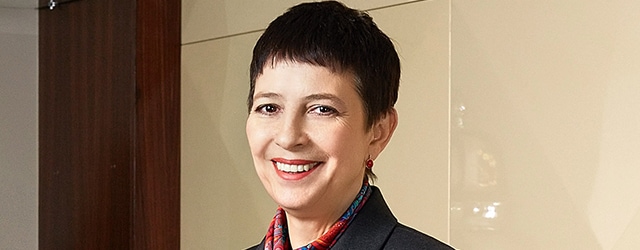Yulia Tseplyaeva, now chief economist for Russia at Sberbank, held the same post at BNP Paribas and Bank of America-Merrill Lynch. She speaks about Russia’s pivot East and adjustment to ruble devaluation.

Global Finance: Three years ago Russian leaders were very enthusiastic about an economic “pivot to the East.” What has come of it?
Yulia Tseplyaeva: Russia started fighting for Asian markets in 2008, and progress has been quite significant. We are now the number three supplier of oil to China after Saudi Arabia and Angola. But we could not say we are absolutely happy. The speed of the drive to the East is a subject of criticism from much of the Russian economic elite. Russia remains very dependent on European imports of machinery and equipment, which comprises 47% of all Russian imports. On the other hand, European attempts to substitute Russian oil and gas have also not been very successful. So we don’t consider this situation to be a threat.
GF: What about import substitution driven by ruble devaluation?
Tseplyaeva: The share of imports in food retail trade has dropped by 11pp [from 34% to 23%] in 2014-16. The embargo in food imports from EU should have been resulted in more significant drop. Imports’ share in consumption in general contracted less dramatically from 42% to 38%. Even if imported beef is too expensive, it is not that easy to produce more domestic beef immediately. We will probably see import substitution in machinery in the future, but not now. If we could see certain structural reforms, I’m sure there is potential in this sphere. Russia has adjusted to oil prices at a new level, which is a great achievement. But if you talk about substantial benefits from ruble devaluation, I would say no. exports are not diversified yet. After a drop in consumption of 8% in 2015, we saw another decline of almost 4% in 2016. People paid a severe price for this crisis.
GF: Why has the pivot to the East happened so slowly?
Tseplyaeva: On the macroeconomic front, Russia is only fully competitive in raw materials. But Russia is trying to emphasize manufactured or high-tech goods, so this is a problem. The number two issue is that the negotiation culture of our Asian partners is a little bit different. It was not clear to many Russian companies that to sign an agreement without details and final prices means nothing in many countries of the region. It took several years to realize that real agreement goes step by step and may take a lot of time.
GF: Are you referring specifically to Gazprom’s mega-agreement with China?
Tseplyaeva: This is a good example of potential success. However, the new technologies of liquefied gas and shale oil may make all these pipelines redundant. I’m sure that Gazprom will move our cooperation with Asian countries to a new level, but time is crucial. If these projects take 10 years to materialize, that could be late.
GF: What is the consequence from the tremendous outflow of capital from European loans and bonds that were not rolled over?
Tseplyaeva: Russia is an underinvested country. However, I’m not sure all these funds really would go into investment. Russian corporate profits rose by 38% last year, but investment by only 4.5% in nominal terms and fell 0,9% in real terms. This tells you that even if companies have the resources, they may not want to invest if the situation is uncertain and demand is weak. What we have now is a particular Russian crisis driven by sanctions and the structural disproportion of the economy toward oil and gas.
GF: How optimistic are you compared to the depths of the crisis in 2015?
Tseplyaeva: Nothing lasts forever, and that includes the crisis. Economic growth will go up, but the big question mark is the speed of this growth. Without structural growth and strengthening of institutions, we will have potential growth of about 1.5% a year. To accelerate growth, economic reforms are absolutely necessary. Everyone understands this, including the Russian authorities. However, taking into account the presidential election in 2018, I doubt we will see a real progress in reforming already this year.



